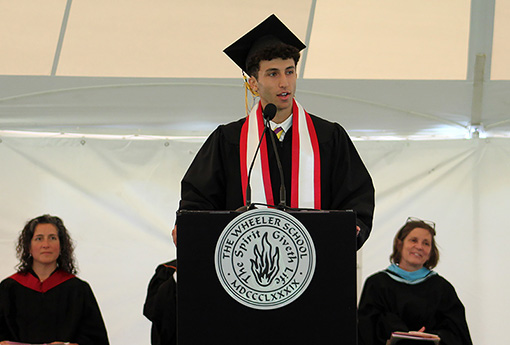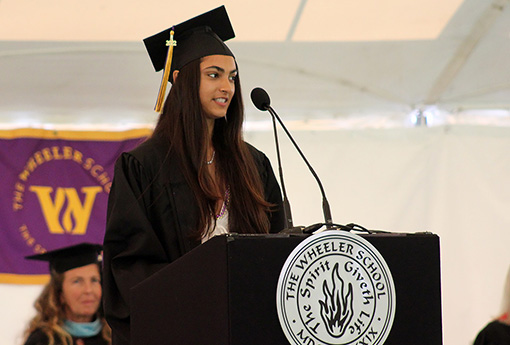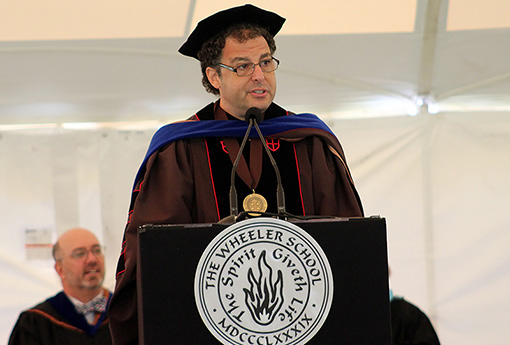
What Will We Remember?
September 18, 2020
Seventh and Eighth Grade Parents’ Night Welcome
By Vanessa O’Driscoll, Middle School Director
I’d like to start our conversation tonight by reading a poem. I was an English teacher for two decades, and I started every class with a poem. It’s a hard habit to break. Sometimes I will hear a snippet of a conversation or a piece of phrase and think to myself, “Oh that reminds me of a poem…” They flow through my head like song lyrics. Today’s poem is called “Mockingbird” and it’s by Louis Jenkins.
Mockingbird
I remember when I was a child I had a pair of canaries
in a cage in my bedroom. I had the idea that I would
raise and sell canaries. I asked one of my sisters if she
remembered them. She remembered that they were
parakeets, not canaries. I asked another sister. She said
she didn’t remember any canaries but she remembered
how mean I was to her. My youngest sister doesn’t
remember having birds but thinks that we had a pet
rabbit. I don’t remember that. My brother thinks we
had a pet crow that talked. I don’t remember a crow
but I remember we had a myna bird for a while that
said, “Hello sweetiepie,” but he belonged to someone
else. My mother says that she would never have
allowed birds or any other animals in the house. I
remember how the female canary ignored the male
but chirped plaintively to a mockingbird that sang
outside my window all summer long.
It’s September 17, 2020. The day is almost over and relegated to history. In twenty years, how will I remember this day? Will I remember driving to The Farm, the hazy sky, that I forgot a spoon to eat my lunch? Will I remember speaking to you on Zoom? Will I remember that the reason I drove to The Farm and spoke to you on Zoom was because of COVID-19? That the sky was hazy because of wildfires in the west whose smoke has crossed the country? Or that I found a dusty spoon at the bottom of my bag after having borrowed one from Paul Pieri? COVID, the wildfires, they’re Capital-H HISTORY. My spoon, my drive, they’re lowercase-h history.
All of us today, we are living through history. That’s not something special about us; every human being has lived through their own history, right? Every person has had their lowercase-h history and the their Capital-H HISTORY. When middle schoolers read March, Persepolis, or Maus, they learn personal histories set against the backdrop of massively significant cultural moments: the American Civil Rights Movement, the Iran/Iraq war, The Holocaust. They learn that the personal always intertwines with the larger moment. They learn that we are all citizens of our world, products of our time.
This particular moment in time, this fabled 2020, has had aspects that will be remembered through the ages as particularly complicated. Meanwhile, our children are growing up steeped in this brew. What I wonder is, what will they remember?
As Louis Jenkins’ poem reminds me, we all have our own version of the story. Our own version that trails us into adulthood and becomes our truth. What I hope is that our students hold on to the hard truths of this time, a year when health and safety felt uncertain, but also onto the hope, a year when people gathered their strength to confront the ways we must ensure health and safety for all. I hope they will learn from the Capital-H HISTORY of this time, learn how to grapple with the heartache. And at the same time, I hope they will hold on to their lowercase-h history, and that it sings.
As they look back on this Fall 2020 at Wheeler, I hope they will remember their friends, their teachers, that time they got to do that one really cool thing in history, or Spanish, or art. Yes they were masked, yes their hands were a little bit raw from overwashing, but they had those regular daily middle school experiences that make one’s middle school history both mundane and monumental.
To you, their parents, I hope you enjoy watching them enjoy these years. I too am a middle school parent. It’s a little hard to fathom. I too, am stunned that my sweet little human is in this moment of her history, well on her way to the rest of her life.
Because I can’t resist, I am going to bring in another poem. This one is by Robert Hershon and has a rather cryptic title.
Sentimental Moment, or Why Did the Baguette Cross the Road?
Don’t fill up on bread
I say absentmindedly
the servings here are huge
My son, whose hair may be
receding a bit, says,
did you really just say that to me?
What he doesn’t know
is that when we’re walking
together, when we get
to the curb
I sometimes start to reach
for his hand
I know we all have a lot of time before our middle schoolers’ hair starts receding, but this poem never fails to get me in that nostalgic spot that makes my eyes sting. Our children are growing up, but we still are desperate to guide them, to teach them, and to protect them. Especially in this strange, strange year. Your children’s teachers feel the same way. The phrase I have heard more than any other this summer and fall, as we have all worked so hard to adapt our program, is, what is best for the children? Thank you for entrusting your children to us, and thank you for supporting them, and us, as we bravely saunter forth in this historical moment together.

